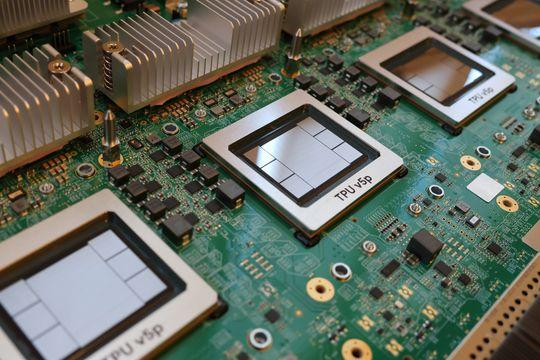OpenAI Adopts Google TPU, Adjusts Compute Strategy
Reasons for OpenAI's Compute Strategy Adjustment

There are several main reasons for OpenAI's adjustment of its compute strategy. Firstly, reducing dependence on NVIDIA is one of the important considerations. Although NVIDIA GPUs dominate the AI field, with the rapid development of AI technology, computing power costs have gradually become a focus for enterprises. Google TPUs have demonstrated higher energy efficiency in specific scenarios, especially in large-scale parallel computing tasks, where they can significantly reduce the cost per unit of computing power. In addition, OpenAI aims to enhance its autonomy and flexibility in the market by reducing dependence on a single supplier, in order to better cope with potential future market changes and technological developments.
Secondly, reducing the binding to Microsoft's data centers is also an important factor in OpenAI's decision. Previously, OpenAI mainly obtained NVIDIA chips through cooperation with Microsoft and Oracle for model training and deployment. However, with the rapid growth of OpenAI's user base, its demand for computing power has also increased, deepening its dependence on Microsoft's data centers. This shift to Google TPUs shows that OpenAI is gradually breaking free from the deep dependence on Microsoft's data centers, which are its investors, reserving space for possible cloud service provider switches in the future and further enhancing its independence and competitiveness in the AI field.
Lastly, addressing the challenges of user growth and computing power demand is also a key factor in OpenAI's compute strategy adjustment. OpenAI's user base is growing rapidly, and its demand for computing power is also increasing explosively. However, the supply of NVIDIA GPUs faces certain bottlenecks, posing a severe challenge to OpenAI's acquisition of computing power. In order to ensure that the inference capabilities of products such as ChatGPT are not affected, OpenAI must seek alternative solutions to meet its growing computing power needs. Google TPUs, with their powerful computing power and higher energy efficiency, have become one of the ideal choices for OpenAI.
Impact on OpenAI Itself
● From a cost-effectiveness perspective, OpenAI expects that renting TPUs via Google Cloud will help reduce the costs associated with the inference stage. This will enable OpenAI to optimize its cost structure and improve operational efficiency while maintaining business growth.
● From a technical flexibility perspective, adopting Google TPUs provides OpenAI with more technical options and flexibility, allowing it to select the most suitable computing power solutions based on different business needs and scenarios. This diversified computing architecture will help OpenAI maintain a leading position in future technological development.
Significance for Google
● TPU Market Expansion: This collaboration comes at a time when Google is expanding the external supply of its self-developed TPUs. Previously, TPUs were mainly used for internal projects but have now attracted the favor of tech giants and startups such as Apple, Anthropic, and Safe Superintelligence. The cooperation with OpenAI further consolidates Google's position in the AI chip market and enhances its influence in the high-end AI cloud market.
● Technical Validation and Endorsement: The fact that one of the world's most core AI companies, OpenAI, has started to purchase Google's TPUs means not only that Google has successfully commercialized the TPUs it has used internally for many years but also that it has received a "heavyweight endorsement." This indicates that the performance, stability, and ecosystem toolchain of TPUs have met OpenAI's high standards.
Future Outlook
In the future, OpenAI may continue to optimize its computing architecture, further reduce dependence on single suppliers, and explore more technological innovations and cost optimization solutions. In addition, OpenAI may also push forward with its own AI chip development projects to meet its growing computing power needs. Meanwhile, Google will continue to expand the market influence of TPUs, attracting more large model companies to switch to its platform. Google may also further enhance the performance and functionality of TPUs to meet the needs of different customers.
In summary, with the diversification of the AI chip market, companies such as NVIDIA and Google will face more intense competition. This will drive companies to continuously innovate and enhance their technological capabilities to maintain a competitive edge. At the same time, it also provides opportunities for other emerging companies, promoting the development of the entire AI industry.
Discover Conevo IC Distributor
Conevo is a leading global IC distributor, specializing in a wide range of semiconductor chips, including FPGA, MCU, DSP, and Converters. We offer competitive pricing, immediate shipment, and comprehensive solutions for component shortages. Here are some of our hot and carefully selected IC models:
● AMD XCR3512XL-10FT256I: A high-performance FPGA with extensive logic resources and I/O flexibility, ideal for complex digital designs.
● Intel EPM7256SRI208-10N: A versatile CPLD with high-density logic and programmable features, suitable for a variety of embedded applications.
● MPS MP2143DJ-LF-Z: A high-efficiency synchronous buck converter with a wide input voltage range, perfect for power management in compact designs.
Website: www.conevoelec.com
Email: info@conevoelec.com








